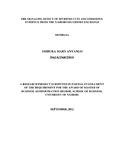| dc.description.abstract | The study set out to establish the signaling effect of dividend cuts and omissions for firms listed at the Nairobi Securities Exchange. It intended to establish if there exist a relationship between the dividend cuts/omissions, EPS, earnings for the listed firms at the NSE in light of operational activities and if this could reliably test the signaling effect of dividends, which has been a puzzle. Studies have been done in developed world in testing the reliability of signaling effect of dividend cuts/omissions, but not much has been known about using operational activities to test the reliability of the signaling effect of dividend cuts and omissions in developing countries. This therefore motivated my study in a developing market
This study used continuously listed companies from 2007 to 2011, which comprised of 41 firms that formed my population. After screening, the final sample contained 13 firms, eight being action firms and five non action firms. The information gathered was summarized and their correlation determined. Regression analysis was used to estimate the degree of relationship. The study established a positive correlation of 58.3% at 0.151 level of significance for 1-tailed test, with a coefficient of determination, R square of 78.5%, this is statistically significant relationship between dividend cuts/omissions and changes in earnings for the action firms for the period of 2007 – 2011 for the sampled firms. There was a strong negative correlation of -84.8% at a significance level of 0.0035 1-tailed test at an adjusted R square of 62.6% for non action firms The performance of the action firms was better in the second year than first year while worse for non-action firms in the second year than first year.
This study therefore has added value to the body of corporate financial management discipline by bringing a new perspective in testing the reliability of signaling theory of dividends by incorporating proactive operational activities before the dividend cuts such that future cash flows remain certain. The findings of this study will be of interest to academicians since it will shed some light on an existing debate in the literature by trying to solve the complexity of testing the reliability of signaling theory of dividends which has been a puzzle.
The findings of this study will also help in the understanding how signaling effect determine a firm’s dividend policy, which is a tradeoff between retained earnings on one hand and distributing cash or securities on the other, hence help to understand the reliability of the signaling effect on dividend policy adopted by a firm. | en |

